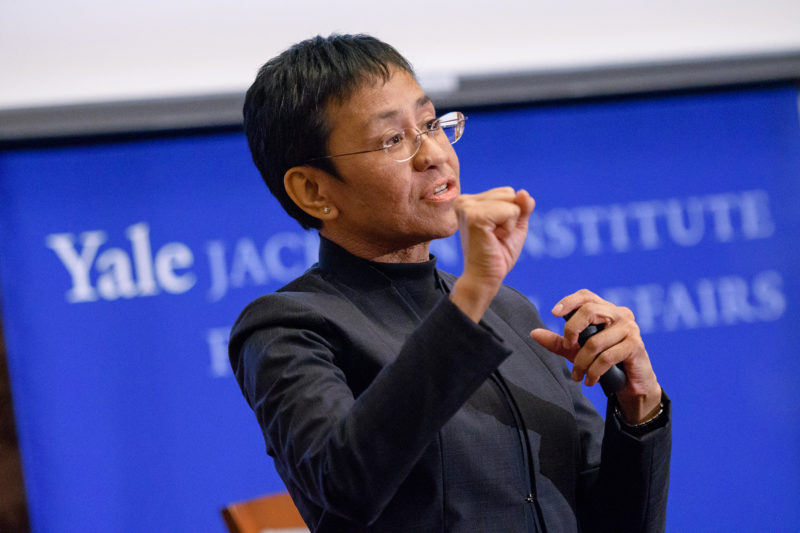Award-winning journalist and activist Maria Ressa and Ambassador Harry Thomas, Jr. sat down for a conversation March 3, 2020.
Filipino journalist and human rights activist Maria Ressa is well-acquainted with the dark corners of the internet. She has devoted her career to shining a light on the destructive effects that disinformation, fake news, and online harassment can have on a democracy.
Ressa offered an insider’s account of her work in the Philippines during a public talk at the Jackson Institute for Global Affairs on March 3, part of Jackson’s Visiting Fellow Discussion Forum series.
The conversation was moderated by Jackson Senior Fellow Harry Thomas, Jr., who served as U.S. ambassador to the Philippines from 2010-2013. In his introduction, Jackson’s deputy director for leadership programs Ted Wittenstein called Ressa a “warrior for freedom of the press and a personal hero.”
Ressa talked about how the online news site she co-founded, Rappler, works to expose fake news using data analysis and fact-based reporting. The problem, Ressa explained, is that “lies spread faster than the truth. Lies capture your attention.”
“If you can make people believe the lies are the facts, then you can control them,” she said. For authoritarian regimes, “information is power,” Ressa said.
The “scorched earth” tactics of information warfare include attacking a person’s credibility, alleging corruption, and repeating those claims over and over, Ressa explained. “You can see how this is a full-time job,” Ressa said, pointing to Rappler’s data analyses and sophisticated tracking of these online posts.
“It’s so systematic that you can break it down into demographics,” she said, explaining how certain bloggers target different groups and customize the messaging aimed at them. “You do it step-by-step. It’s meant to shift the way you think,” she said.
For her work, Ressa has been targeted with online harassment and death threats, and jailed by the authoritarian government of President Rodrigo Duterte. And she is not the only target. “Journalists are under attack globally,” she said. “We have to hold the line.”
She also addressed the role that tech companies play, calling for greater accountability, more government regulation, and better protections for users.
“Journalists have lost our gate-keeping power. It has gone to the tech companies,” she said. And those companies, specifically Facebook, haven’t effectively enforced regulations or protected user privacy, she said.
“They moved fast and broke democracy,” Ressa quipped, referring to Facebook founder Mark Zuckerberg’s famous motto. “Facebook will protect us if they think they will lose the network [of users].”
Ressa emphasized the importance of tackling the problem head-on.
Following World War II, “we decided we needed to protect humanity from the worst of what humans can do,” she said. “It’s a brave new world. We have to demand protection.”
